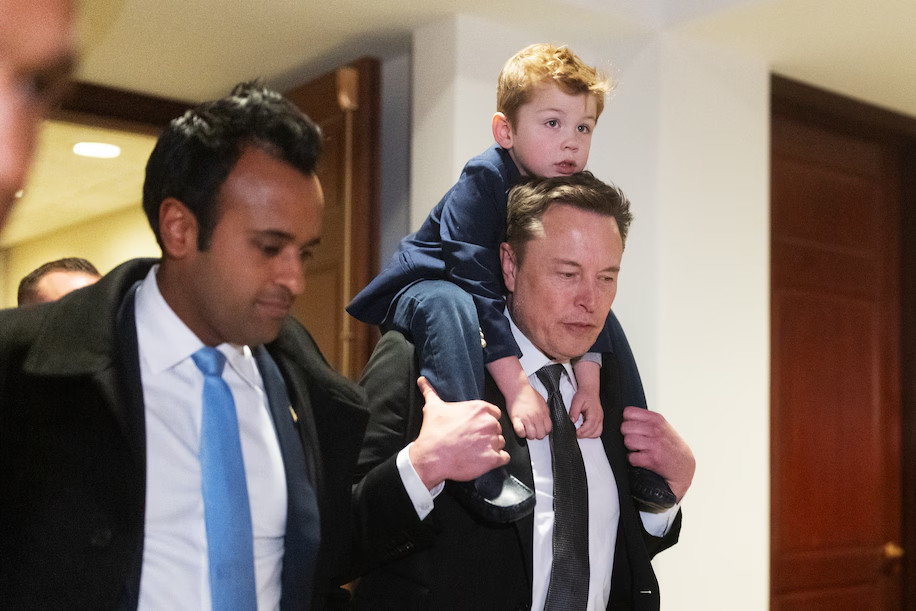
Date: 2026-01-20 Page is: DBtxt003.php txt00027786
US POLITICS
REPUBLICANS FACING REALITY
Republicans averted a shutdown, yet showed boundaries of Trump’s
power ... a preview of the perils of governing that face Trump
and Republicans in Congress, despite their narrow majorities.
REPUBLICANS FACING REALITY
Republicans averted a shutdown, yet showed boundaries of Trump’s
power ... a preview of the perils of governing that face Trump
and Republicans in Congress, despite their narrow majorities.

Speaker Mike Johnson (R-Louisiana) arrives to a closed-door GOP meeting ahead of
a potential vote on a revised continuing resolution bill at the Capitol on Friday.
(Allison Robbert for The Washington Post)
Original article: https://www.washingtonpost.com/politics/2024/12/22/trump-shutdown-crisis-analysis/
Peter Burgess COMMENTARY
I usually like what Dan Balz writes, and this is no exception.
I archived this article soon after it was written, well before the Trump inauguration in January 2025.
I also went back to the inauguration 8 years ago at the start of the first Trump term.
I was appalled by the Trump election of 2016 ... and the idea that Americans would elect Trump for a second term is very difficult for me to comprehend. I am reminded of a popular British radio program from the late 1940s ... 'Ignorance is Bliss ... 'Tis folly to be wise' ... which the 'grown-ups' in my extended family seemed to enjoy when I was around 7 years old!
Fast forward almost 80 years and I fear the American electorate has embraced this mantra.
I watched the inauguration ... as entertainment it was very good, but as a preview of the manner in which is going to world power it is a likely nightmare!
While Trump and his political allies now control the Administration, the Senate and the House of Representatives ... not to mention the Supreme Court, it is likely that as of now (three days after the inaugoration) considerably less than half of the American people actually are in support of a radical Trump agenda. Rather few Trump voters know much about what Trump is planning to do in practice now that he is in power, even though they are unhappy with what has happened in their own lives over the past several years. If Trump blames, Bidrn, they are following ... even though in most cases Biden has done an amazing amount for the US economy when Trump esentially did nothing ... except delivering a big tax break to those at the top of the US economy.
Most likely, Trump was do another tax break for those with wealth ... and power ... at the expense of everyone else.
Peter Burgess
This week’s events were a preview of the perils of governing that face Trump and Republicans in Congress, despite their narrow majorities.
December 22, 2024 at 5:00 a.m. EST
Analysis by Dan Balz ... Dan Balz is chief correspondent at The Washington Post. He has served as the paper’s deputy national editor, political editor, White House correspondent and Southwest correspondent.
It could have been worse. In the end, Congress averted a government shutdown. But the events leading up to Friday’s late-night passage of a spending bill illustrated the perils of governing that President-elect Donald Trump and congressional Republicans are likely to face in the year ahead, even when they have control of all branches of government.
The drama of the past week highlighted problems for various players. For Trump, this was recognition that as much power as he has, there are limits to what governing-by-Truth-Social can accomplish in a legislative environment. No wonder Trump prefers executive action and recess appointments to the gritty business of holding his own party together.
Trump can dictate and he can threaten, as he has been doing. His allies can warn Republican lawmakers in the House or the Senate that if they don’t toe the line, they will face primary challenges. But when 38 House Republicans reject his entreaties, as they did at one point in the negotiations over the legislation to keep the government open, that’s evidence that his power has boundaries.
Whether it’s levels of government spending or nominations for his Cabinet and other positions that require Senate confirmation, Trump and his party may control both chambers in the coming year but not with such commanding majorities that he can have his way willy nilly.
Will this past week’s drama, for example, remind Republicans in the Senate that they represent a separate branch of government and therefore have the power to block a few of Trump’s most controversial nominees, even at the risk of displeasing him?

Vivek Ramaswamy and Elon Musk, with his son X, depart the Capitol building on Dec. 5. (Craig Hudson for The Washington Post)
House Republicans again revealed themselves as a fractured family. No surprise there. Trump can’t do much about that, but it will affect his legislative agenda, most clearly on how much and where the government spends its money. He lost a battle to suspend the debt ceiling for two years, revealing a split within Republican ranks over the debt, deficits and spending cuts that has been playing out for years and giving a succession of Republican speakers heartburn.
House Speaker Mike Johnson (R-Louisiana), in fits and starts, got the win needed to avert a shutdown. But victory again required the help of Democrats and again underscored his vulnerability in a GOP conference that has only a slender majority and that will have an even smaller majority in the new Congress next year — one of the smallest in history.
Johnson emerged with big questions about whether he can be reelected as speaker in January. If Democrats under House Minority Leader Hakeem Jeffries (New York) hold firm, Johnson would need a fully united conference behind him when the election of a speaker comes up at the start of the new Congress.
Already, there are some Republicans who are saying they will not support him. Let’s see what transpires over the next few weeks. Do they want to start the second Trump era mired in their own internal battles at a time when the incoming president wants to tell the country and the world that he and his party are in charge and prepared to do the people’s business?
Republicans made a hash of themselves at the beginning of the last Congress, going through 15 ballots before they elected then-Representative Kevin McCarthy (R-California) as speaker, only to depose him less than a year later. Getting Johnson elected required more drama and missteps. Would another contested speaker’s race be any different?
The newest player in all this was Elon Musk, the world’s wealthiest person and seeming a confidant of Trump who is using his association with the president-elect to the fullest. Musk helped kill the first bipartisan spending package with posts on his X social media platform, some with inaccurate claims about the legislation, that helped sink what Johnson thought was a carefully crafted agreement.
Musk seems to enjoy flexing his muscles in the political arena, but with no experience in the legislative process. All week, the question kept being asked: Who elected Elon Musk? Was he empowered by Trump to do what he was doing, or was he freelancing with a megaphone almost as large as the incoming president’s? Whatever the case, he is diving in.
Along with Vivek Ramaswamy, the onetime rival of Trump for the Republican nomination who is now one of his strongest allies, Musk has been tasked with bringing efficiency and less spending to government through the “Department of Government Efficiency” (DOGE), an unofficial committee created by Trump.
Musk’s initial claims about how much can be cut from government were extravagant and likely unachievable, unless he and Ramaswamy recommend taking an ax to federal entitlement programs and the defense budget.
His first foray into dealing in real terms with the budget underscored that he remains a novice in this arena. As smart and entrepreneurial as he has been in developing electric vehicles or sending rockets into space, the business of government doesn’t conform to the business of business.

Trump, right, talks with Sen. John Thune (R-South Dakota), left, and Speaker of the House Mike Johnson during the Army-Navy football game at Northwest Stadium in Landover, Maryland on Dec. 14. (John McDonnell for The Washington Post)
It’s difficult to see the path ahead on this front and where Musk will settle as he delves into the details of federal spending. Will his instincts and recommendations align with those on the hard right in Congress, who have railed against debt and deficits, or will he align with Trump, who has never worried about deficits and who added trillions to the national debt during his first term and is prepared to do so again by extending the tax cuts approved when he was previously in office?
However that plays out, Musk was reminded that the Constitution gives Congress the power over the purse, that presidents and their advisers can recommend budgets and the structures of the executive branch, but Congress has the authority to say what will be spent and how the money will be spent.
The one player who was a non-player in all this was the sitting president, Joe Biden. There was no need for him to get his hands dirty in these negotiations, as all the conflict was confined to the Republican side of the aisle in the House. But his absence reinforced the view of a detached chief executive who has remained largely out of view since Trump defeated Vice President Kamala Harris last month.
It’s customary for presidents on their way out of office not to interfere with the incoming president, especially when an administration has been rejected in the election. Biden had his meeting with Trump at the White House shortly after the election and pledged to make the transition as smooth as possible. Since then, he’s stayed in the background and has had little to say, other than at the time when Israel and Hezbollah declared a ceasefire in their war.
Which is to say that, a month before Inauguration Day, Trump has been empowered and Biden has been diminished. And for Trump that has brought some good moments but also, as this past week proved, some reminders that power, even for a president, is constrained and for good reasons.
Trump’s second presidency
Follow live updates on the transition to President-elect Donald Trump’s presidency. We’re tracking the people Trump has picked or is considering to fill his Cabinet.
FBI: FBI Director Christopher A. Wray announced he would resign at the end of the Biden administration, stepping down before Trump takes office and can fire him after Trump announced he would nominate loyalist Kash Patel to serve as FBI director.
Health: Trump selected Robert F. Kennedy Jr., a longtime vaccine skeptic, to lead the Department of Health and Human Services. Here are some of his planned priorities, from vaccines to raw milk.
Justice Department: After former Congressman Matt Gaetz (R-Florida) withdrew his bid to be Trump’s attorney general, Trump announced that he plans to nominate former Florida attorney general Pam Bondi to the Cabinet role.
DOGE: Trump announced he is tapping Elon Musk and Vivek Ramaswamy to lead the “Department of Government Efficiency,” a new commission on cutting government spending and regulation. Here are 10 programs that could be on the chopping block and what we know about DOGE.
What else could change: Trump promised executive orders to impose new tariffs on all imported goods from China, Mexico and Canada. Trump has promised to close the Education Department, and many Republicans are with him. Here’s what that would mean. By Dan Balz ... Dan Balz is chief correspondent at The Washington Post. He has served as the paper’s deputy national editor, political editor, White House correspondent and Southwest correspondent.follow on X@danbalz Follow More For You Kerry Washington has a message to deliver Today at 6:00 a.m. EST headline Trump signals plans to use all levers of power against the media Today at 6:00 a.m. EST